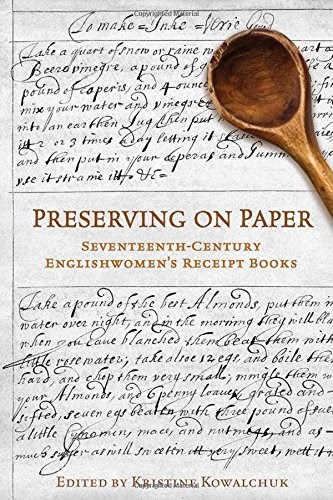Preserving on Paper
October 8, 2017 by Darcie Cookbook
enthusiasts often read vintage cookbooks for entertainment, using
them to imagine past ways of cooking and eating. Kristine Kowalchuk
also enjoys digging into old cookbooks, although she approaches
them from a very different perspective. As part of her Ph.D. thesis
at the University of Toronto, Kowalchuk wrote Preserving on Paper, a critical
edition of three seventeenth-century ‘receipt books’. These
handwritten manuals included a combination of culinary recipes,
medical remedies, and household tips which documented the work of
women at home.
Cookbook
enthusiasts often read vintage cookbooks for entertainment, using
them to imagine past ways of cooking and eating. Kristine Kowalchuk
also enjoys digging into old cookbooks, although she approaches
them from a very different perspective. As part of her Ph.D. thesis
at the University of Toronto, Kowalchuk wrote Preserving on Paper, a critical
edition of three seventeenth-century ‘receipt books’. These
handwritten manuals included a combination of culinary recipes,
medical remedies, and household tips which documented the work of
women at home.
As she was writing the book, Kowalchuk believed that receipt books served as a form of folk writing, where knowledge was shared and passed between generations. The texts played an important role in the history of women’s writing and literacy and contributed greatly to issues of authorship, authority, and book history. But now, Kowalchuk thinks that the books represent something even more important.
In a recent article on the website The Recipes Project, Kowalchuk explains why she sees these books as “the ultimate feminist texts.” The cookbooks represent a time when women were the authorities on a number of subjects such as food and medicine. Over the intervening centuries, Kowalchuk argues, the cultural outlook changed to a more patriarchal viewpoint, where “values of dominion over nature, individualism, and capitalism arose as new, male-dominated professions – chefs, doctors, and apothecaries – assumed individual authority over women’s collective knowledge and dismissed, ridiculed, and persecuted the women who persisted with special knowledge in food and medicine.” Reading old ‘receipt books’ with this viewpoint, we learn that women were vital to advancing the scientific method, among other accomplishments.
Categories
- All Posts (7075)
- Antipasto (2205)
- Author Articles (250)
- Book News (944)
- Cookbook Giveaways (996)
- Cookbook Lovers (262)
- Cooking Tips (116)
- Culinary News (299)
- Food Biz People (558)
- Food Online (800)
- Holidays & Celebrations (277)
- New Cookbooks (154)
- Recipes (1520)
- Shelf Life With Susie (231)
- What's New on EYB (134)
Archives
Latest Comments
- Indio32 on Four outstanding independently published cookbooks worth your attention
- nvernon on Four outstanding independently published cookbooks worth your attention
- fayegibson on Four outstanding independently published cookbooks worth your attention
- Pizzacat13 on Balli Balli – Cookbook Giveaway and Quick Bites
- Laura1 on For the Love of Lemons by Letitia Clark – Giveaway
- fms95032 on For the Love of Lemons by Letitia Clark – Giveaway
- fms95032 on 20 Amici – 40 Ricette Cookbook Giveaway
- fms95032 on French at Heart – Cookbook Giveaway
- Shelmar on Tea innovations
- dzm on 20 Amici – 40 Ricette Cookbook Giveaway